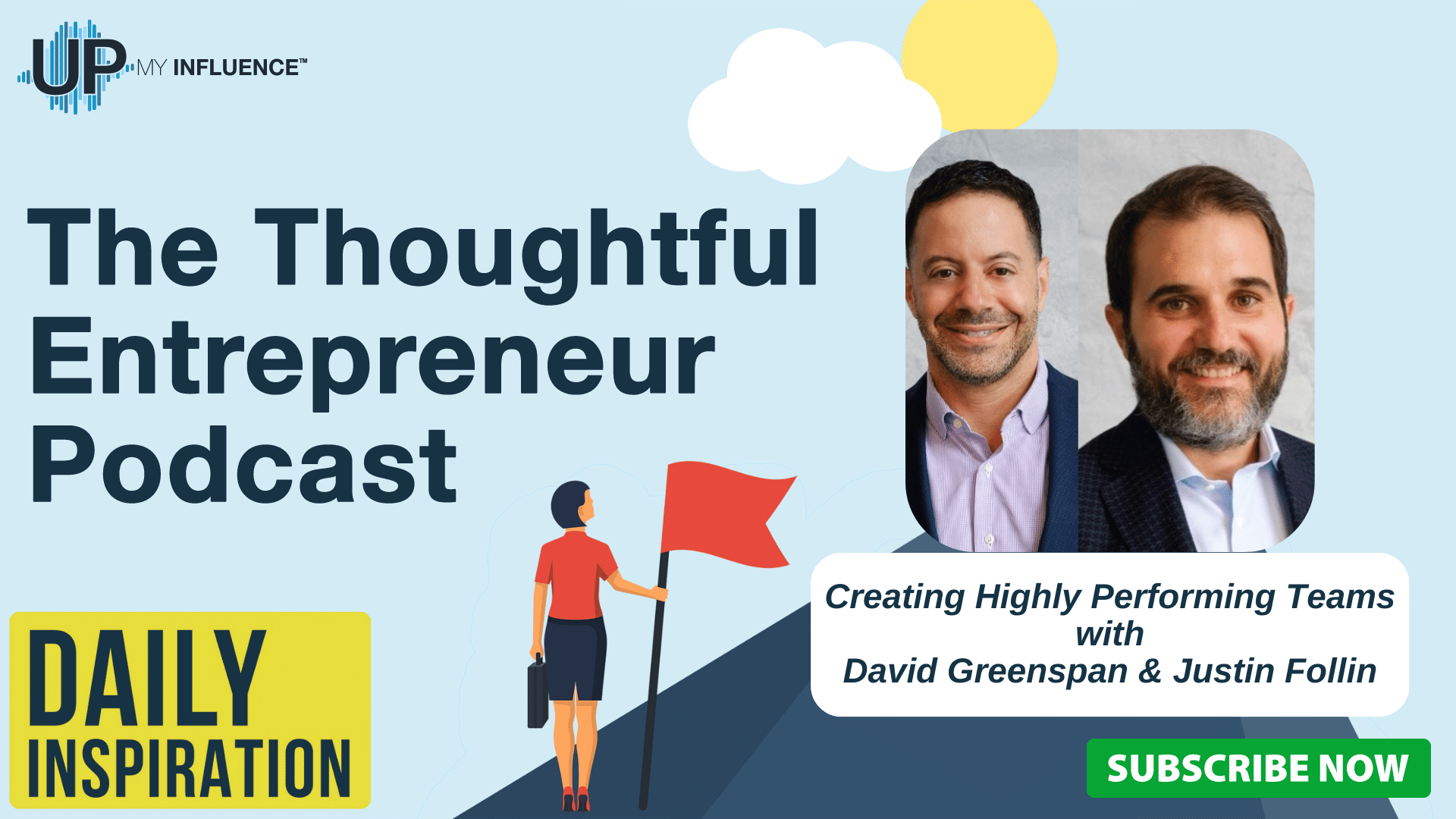THE THOUGHTFUL ENTREPRENEUR PODCAST
In this episode of the Thoughtful Entrepreneur, your host Josh Elledge speaks with the Chief Growth Officer & CEO of BLUECASE, David Greenspan & Justin Follin.

Justin and David have dedicated their careers to elevating mid-market companies by forging high-performing teams. Their approach is a blend of strategic planning and leadership development designed to harness a company's collective intelligence, creativity, and innovation. The goal? To enhance performance, accelerate scaling, and cultivate extraordinary company cultures.
Justin and David illuminated the workplace concept where everyone can contribute fully and collaborate seamlessly. They highlighted a common hurdle in today's organizations: disengagement. It's a challenge that many face, yet few overcome.
According to them, the key lies in building teams proficient in communication, listening, and the art of feedback—skills foundational to engagement and a flourishing company culture.
David shared his insights on strategic planning, emphasizing the necessity of a clear and differentiated strategy that can be distilled onto a single page.
This clarity is not just about having a direction but about articulating it in a way that resonates with the entire team. Leadership systems and a culture of continuous improvement were also underscored as vital components of a successful strategy.
Key Points from the Episode:
- Introduction of Justin Follin and David Greenspan, co-founders of Blue Case
- Blue Case's focus on strategic planning and leadership development for mid-market companies
- The importance of creating a culture for people to contribute fully and work effectively
- Challenges of working in organizations and default disengagement in companies
- Emphasizing the need for effective communication, listening, and feedback in teams
- Importance of clear, differentiated strategy articulated on one page
- Discussion on leadership systems and creating a culture of continuous improvement
- Commendation of the book “Be a Better Team by Friday: A Playbook for High-Performance Business Leaders.”
- Tips for better meetings, including defining purpose, justifying attendance, and implementing effective practices
About David Greenspan:
David B. Greenspan, PhD., is a distinguished figure in leadership development as the founder and Chief Growth Officer of BLUECASE Strategic Partners. Based in Austin, Texas, since its inception in 2014, his consultancy focuses on strategic planning, executive coaching, and fostering high-performance cultures in rapidly expanding companies. Alongside this, he emphasizes the importance of cross-functional collaboration and feedback-rich environments.
As a co-author of the Amazon best-selling book “Be a Better Team by Friday: A Playbook for High-Performance Business Leaders,” David offers CEOs and executives practical strategies for scaling company growth and nurturing effective team dynamics. His expertise lies in high-performance psychology, analyzing the mechanics behind exceptional individual and team performances in challenging conditions.
With a Ph.D. in High-Performance Psychology, David is renowned for creating transformative corporate cultures and teams. He has over fifteen years of experience advising senior executives in Fortune 100 companies and executive teams in fast-growing, private equity-backed businesses. He is recognized for his ability to inspire and achieve extraordinary results.
About Justin Follin:
Justin Follin, the co-founder and CEO of BLUECASE Strategic Partners, is a crucial figure in leadership development and executive coaching. Based in Austin, Texas, his company, established in 2014, specializes in strategic planning and improving cross-functional collaboration and engagement in fast-growing companies.
Justin co-authored the Amazon best-seller, “Be a Better Team by Friday: A Playbook for High-Performance Business Leaders,” a guide for CEOs and executives focused on scaling company growth and fostering team culture. A trusted advisor to CEOs in rapidly expanding sectors, Justin has coached leaders in companies with revenues between $20 million and $2 billion.
His expertise extends to coaching various professionals, from TEDx presenters to musicians. A graduate of the University of North Carolina at Chapel Hill, Justin holds a degree in Philosophy with a focus on business and ethics. He enjoys music, yoga, and frequent visits to Barton Springs pool in his leisure time.
About BLUECASE:
BLUECASE Strategic Partners is a strategic consultancy specialising in harnessing untapped organisational potential. Catering to CEOs, top leaders, and team managers, BLUECASE aims to facilitate extraordinary growth and performance improvements.
Their approach integrates High-Performance Leadership Development Programs, Strategic Planning, and Executive Coaching to address companies' challenges during rapid growth.
Acknowledging that many companies operate below their potential, often due to underperforming teams, especially under pressure, BLUECASE offers solutions to enhance team dynamics and performance. They provide essential processes and skills to ensure teams excel even in demanding situations.
The goal is to quickly and efficiently elevate a company's latent potential, ensuring teams cope with and thrive under the increased demands of accelerated growth. This focus on individual and team development makes BLUECASE a valuable partner for organizations looking to reach peak performance levels.
Apply to be a Guest on The Thoughtful Entrepreneur:
https://go.upmyinfluence.com/podcast-guest
Links Mentioned in this Episode:
Want to learn more? Check out Lucky Hunter website at
Check out BLUECASE on LinkedIn at
https://www.linkedin.com/company/bluecase-strategic-partners/
Check out David B. Greenspan on LinkedIn at
https://www.linkedin.com/in/david-butlein/
Check out Justin Follin on LinkedIn at
https://www.linkedin.com/in/justinfollin/
More from UpMyInfluence:
We are actively booking guests for our The Thoughtful Entrepreneur. Schedule HERE.
Are you a 6-figure consultant? I’ve got high-level intros for you. Learn more here.
What is your #1 Lead Generation BLOCKER? Take my free quiz here.
Want to learn more about all the podcasts managed by UpMyInfluence? Opt in here.

